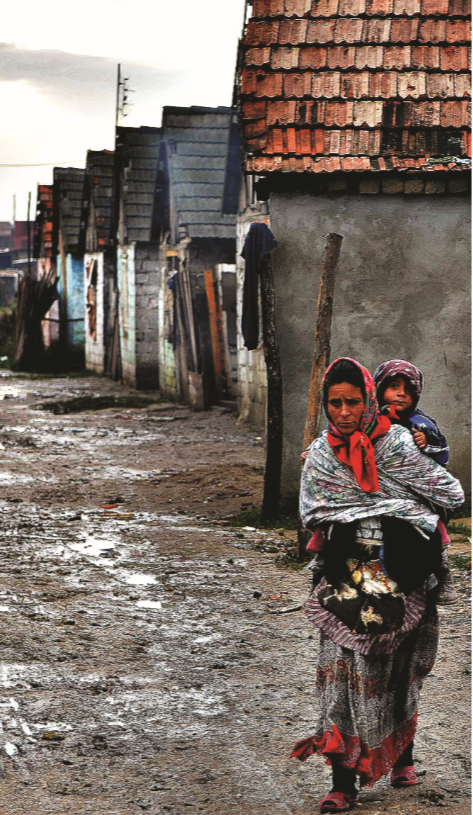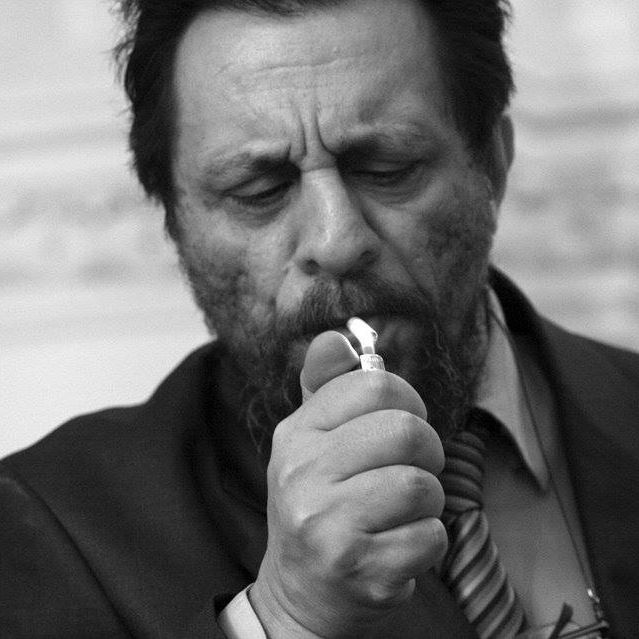Vasile Ionescu is a writer, one of the founders of the Roma political movement in Romania and a member of the Wiesel Commission for the study of the Holocaust in the country. He is the author of several books on the history and culture of the Roma, including Tempest and Melancholy and A Thousand Years of Solitude, The Holocaust of the Roma in Romania, Documents and Testimonies, The Deportation of the Roma in Transnistria: from Auschwitz to Bug.
You are one the leaders of a movement for the emancipation of Roma people. Was it difficult to be a Roma child in Romania?
My first and only day in kindergarten, a Romanian boy said: “Look, a gypsy is coming!” I didn’t go anymore, but when I started going to school I knew I had to do something with my life. The spiritual destiny of a Roma child is fragile, because it is difficult to face a racism that distorts your personality. The books have saved me. At 14, I read Dostoyevsky and Panait Istrati, and they marked me forever. I spent my adolescence reading. It was, perhaps, the way to evade reality, my way of finding balance in the world.
“The spiritual destiny of a gypsy child is fragile, because it is difficult to face a racism that distorts your personality”
That feeling of inferiority, the stigma, has been very strong during all the stages of my life and has created a lack of self-confidence against which I had to fight a lot. Then I studied film-making and sociology, because I could not reconcile the two worlds, the gadjos(foreigners) and the Roma, reason and passion. My people, who are musicians, have given to Europe a way of feeling, and must undertake this revolution, to close the gap between reason and passion. There is still a critical mass among the educated Roma elites that can act as an agent of change. On the other hand, in the case of Roma in Europe, as well as in the case of African-Americans in the US, the failure of a citizenship policy that is not related to race is already obvious and sombre.

How do you explain the current wave of racism suffered by Roma in Europe? Collective expulsions of Roma people in France, violent persecution in Hungary, segregation with walls in Romania…
The history of Roma in Europe is a history of racism and segregation, just like that of African-Americans. Reminiscence of slavery or of an inferior status, race-caste type. Communities in Europe have been built on the basis of relations of kinship, language, property, and irreconcilable foreign-native conflict, centre-periphery, community-ghetto, etc. In Romania, according to the law of slavery, until 1856 the Roma were not allowed to be buried in the Romanian cemeteries, which is still happening today in France, where the funeral of a Roma baby was denied quite recently. The solution for the change this reality is to attack on both sides this “frontier”, pathological and tacit hatred, and create an honest “social contract” that improves bipolar identity problems. I do not want to be Romanian, or Spanish, or French, I want to be a Roma!
The European exclusion of Roma people is a historical issue…
And a hysterical one. Many facts are known: among the slaves of Columbus there were Roma people condemned to the galleys; more than 1.5 million European Roma were deported to the colonies. What remains to be discussed is the impunity of racism against the Roma: slavery, the Holocaust, must be recognized. Without remorse, there is neither forgiveness nor forgetfulness. It is the denial of the dignity of the Roma as a nation.
“Sometimes you forget that the ideology of purity racial already existed among the Spanish conquistadors of the Americas”
It also remains to clarify what the Roma are for the Europeans. Unsuitable savages? A people subjected to ostracism? A European nation? A vulnerable group? After 500 years of rejection in Europe, a solution is required … an acceptable one. Already in 1876 the Roma were spoken of as inferior beings, “social ballast”, and discipline was imposed as a solution. Sometimes it is forgotten that “the purity of blood” and the ideology of racial purity already existed as essential ideas among the Spanish conquerors of the Americas, and then in World War II. After the war, UNESCO was formed and an attempt was made to hide the fact that the educated elites of all countries had been involved in the Holocaust, since racial eugenics had manifested itself at European level. In Romania, during the Second World War, the Roma were sent to the Transnistrian concentration camp. 25,000 people died. Two thirds were children. The question is: who was the other? “Nobody”, has been the answer. Who was my neighbour? Well, my family. Those responsible for the concentration camps had families, played with their children, and then did what we know they have done.
And after the war?
After the Second World War, the European states gave a rudder towards an egalitarianism that wanted to make up the consequences of the Holocaust. But racism still exists. The question today is the same: who is the other, the different? Does the other exist? The other is only the one who is part of the community, with whom I go to bed; the different other is the one who is not part of my community, maybe it exists, maybe it’s next to me, we’ll see… This process of civilization of the asocial, of the different ones, we know it from Michel Foucault, it boils down to discipline and punish, to inclusion as exclusion, to integration as a process of disintegration, etc. It is obvious that Europe is a factory of Roma people, a generic term that designates the excluded. This explains the situation of the Roma in Europe, by a social stratification based on the race-class relationship.
Has the Roma people been mobilized against this situation?
“To transform policies, we need a Roma social movement that leads to change: freedom means that you liberate yourself, not that others liberate you”
I have not seen any protest of Roma people in front of the Council of Europe in Brussels. Neither Roma nor whites speak out against this racism. On the one hand, there is no mass capable of generating change; on the other hand, a question arises: what do the Roma want? Over time, stigmatized identities come to hate themselves. Transforming policies requires a Roma social movement that leads to change. Freedom means that one liberates oneself, not that others liberate you. But the Roma must militate for it, must be in upright position. If you stay out of society, nobody takes you into account. The goal is to achieve social equality, actually nonexistent. The social conditions are given by birth: some have the right to spend their holidays in Saint-Tropez, others to search for food in the trash. In 1789, the Declaration of the Rights of Man and of the Citizen proclaimed that all men were born equal and free, but in 1802 Napoleon reinstated slavery in the colonies.
Do you think a Roma state is possible?
Of course there is an increasing level of collective consciousness, especially in Eastern Europe, where Roma are recognized as a national minority. Now we are in another moment of our history, in spite of the colonizing pressure of the European states, which are in their stage of agony. On a personal level, I agree with the versions of contemporary democracy, but there are also other answers, such as the creation of a Roma state in the free zone of Konigsberg.
Is there a double discrimination against the Roma from Eastern Europe, as an immigrant and as a Roma?
“We have to talk about economic rights, economic equality, not only human rights that seem to have died the same day they were born”
We have to talk about economic rights, economic equality, not only about human rights that seem to have died the same day they were born. The important thing is that the immigrant and the native have access to economic and social development. It is a discrimination that begins in the realm of the economy, with the income, the jobs, etc.
Is there such a thing as “nomadism” among the Roma of Eastern Europe, as the media quite frequently pretend?
What does Nomad mean? When one speaks of a nomad, it refers to a person who has no home. This is the only reality that can be measured. You can call someone nomadic or immigrant or evicted. It is the result of a social context, it is not a choice. The nomadism for pleasure, by personal choice, is called tourism.
What do you think about the European social inclusion policies towards the Roma population?
In the West the situation has improved. The deportation of the marginals in the colonies, considered as a form of integration, no longer applies. The current inclusion policies are similar to Kusturica’s films, everything is improvised. They are different ways of arranging a reality that everyone understands as they please.
“We are facing an abusive situation in which each country conceives its own public policies of inclusion, and this has the effect of a recurring exclusion”
Now we live a rhetorical humanism, of which, however, we can glimpse the hypocritical limits. We are faced with an abusive situation in which each country conceives its own public policies of inclusion, and this has the effect a recurrent exclusion: freedom of movement and the status of a European citizen have led to the expulsion of the unwanted. There is a phenomenon of gitanization of poverty. The gypsy has become a scapegoat for our primary violence. Of course, the situation has to change in some way, because now we live a return to the past, to the European fascism of the Second World War. In my country, the Roma are recognized as a national minority, which means political self-determination and cultural autonomy. There are policies of positive discrimination. Thousands of Roma work in the state administration, thousands more are graduates or doctors, and there is even a network of Roma NGOs, which implies increasing collective consciousness, a development of an educated elite. But let’s not deceive ourselves, it’s a long journey.
The interview was made by Corina Tulbure

